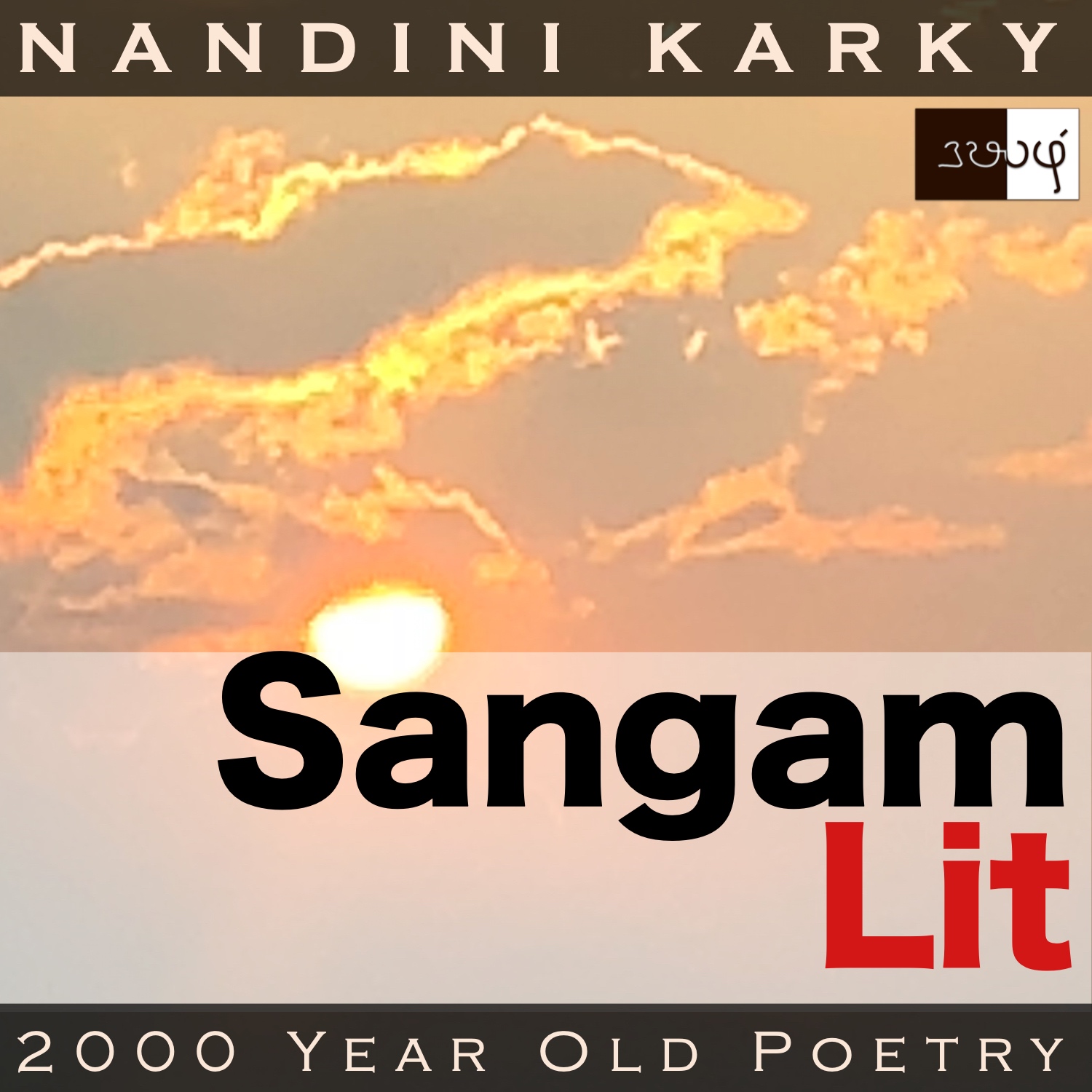Podcast: Play in new window | Download
Subscribe: Apple Podcasts | Spotify | Amazon Music | Android | iHeartRadio | TuneIn | RSS | More

In this episode, we observe the angst that parting away leaves behind, as depicted in Sangam Literary work, Natrinai 241, penned by Madurai Perumaruthanaar. The verse is set in the ‘Paalai’ landscape of drylands and speaks in the voice of the lady to her confidante, refusing to accept the words of consolation, as she is afflicted by the pain of parting.
உள்ளார் கொல்லோ தோழி, கொடுஞ்சிறைப்
புள் அடி பொறித்த வரியுடைத் தலைய
நீர் அழி மருங்கின் ஈர் அயிர் தோன்ற
வளரா வாடை உளர்பு நனி தீண்டலின்
வேழ வெண்பூ விரிவன பலவுடன்
வேந்து வீசு கவரியின் பூம்புதல் அணிய,
மழை கழி விசும்பின் மாறி ஞாயிறு
விழித்து இமைப்பது போல் விளங்குபு மறைய,
எல்லை போகிய பொழுதின் எல் உறப்
பனிக்கால் கொண்ட பையுள் யாமத்துப்,
பல் இதழ் உண்கண் கலுழ,
நில்லாப் பொருட்பிணிப் பிரிந்திசினோரே?
The poem opens with ‘உள்ளார் கொல்லோ’ meaning ‘Won’t he bring to his mind?’ and expresses a deeply felt yearning. The word ‘கொடுஞ்சிறை’ would be interpreted in contemporary times as ‘a terrible prison’ but here, it denotes an object of freedom, a wing, a ‘curved wing’. ‘நீர் அழி மருங்கின்’ meaning ‘water-less places’ conjures before us, a previously moist pond area, that has now dried up. The phrase ‘வளரா வாடை’ is quaint because it talks about ‘the immature northern wind’, featuring the wind as something that’s growing. The word ‘தீண்டலின்’ talks about the ‘touch’ of this breeze and this seems to make the ‘வேழ வெண்பூ’ or the ‘white flowers of the hardy sugarcane bush’ bloom. More about this line in a short while! ‘வேந்து வீசு கவரி’ transports us instantly to the palace of an ancient king, who is holding court there, and around him, stand servants wielding the mentioned ‘bushy fans’ to keep the monarch cool. The two-worded phrase ‘விழித்து இமைப்பது’ finds the English equivalent in the word ‘winking’. A rare occurrence for Tamil has this far appeared to be the more compact language of the two! The phrase ‘உண்கண் கலுழ’ paints the poem with poignance for it means ‘as my kohl-rimmed eyes shed tears’. The verse ends with ‘நில்லாப் பொருட்பிணிப் பிரிந்திசினோரே’ meaning ‘the one who parted away, afflicted by the need to gather this transient wealth’. Let’s delve into the poem to learn more!
The man and lady had been leading a happy, married life when the man parted away in search of wealth. Although the lady accepts the man’s need to part away and bids him farewell, as days pass, she suffers due to the pain of parting. Seeing her thus, her confidante tries to console her. To the confidante, the lady replies, “Won’t it cross his mind, O friend? In the dried-up places, where the feet of birds with curved wings have left behind lined prints, spreading a fine layer of sand, blows the young northern wind. As this wind touches the white flowers of the hardy sugarcane, many flowers therein open their buds and appear, akin to the fans used for kings, pleasing to the eye on the bush. In the sky, as rain clouds part away, the sun appears to be winking now and then during the day. As the day ends and night arrives, cold winds blow in the suffering-filled midnight hour, making my many-petaled-flower-like, kohl-streaked eyes shed tears! Won’t he, who parted from me to go in search of this transient wealth, think about this, O friend?” With these words, the lady expresses the pain in her heart as the man stays away, wondering whether thoughts of her would cross his mind.
Now, for the nuances! The lady starts by asking a question to her friend about the man’s mind. Before she delves deeper into that, she takes us to a place where once a pond stood. Now, the waters have dried up and we know that it was once a wet place when we glimpse at the footprints of birds on the sand around. These winged creatures, having sipped the water, have hopped on the wet sand around, leaving behind the prints of their satisfaction. Now the young northern wind seems to be covering these prints with a fine layer of sand that it brings from elsewhere. As if saying that’s not the only thing I’m here to do, the dainty fingers of the wind seem to reach out and touch the buds of the hardy sugarcane bush and these open out in delight, and seem to look like the fans used for kings. The thing to note here is how the flowers have been characterised as waiting for the call of the breeze to open their buds and within this line, is a deep understanding of how elements in nature are all interconnected and how one cannot exist in the absence of the other!
The northern wind, after doing its duty on land, now rises to the skies and seems to push the rain clouds out and as these clouds part away, the sun behind them seems as if its opening and closing its eyes now and then. Such is the day, which passes by, bringing the suffering-filled midnight, a time when the lady’s eyes fill with tears, pining for her man. At that moment, she wonders whether this search for wealth is worth all this? For wealth is not something that is a forever thing! The very nature of wealth is to fade away, as is youth and beauty. And, it is about this that she questions her friend. Won’t the man think about the impermanence of wealth and return to relieve the suffering of parting in her? Centuries have passed but it’s still relevant to reflect on the many, many transient things that we suffer and toil for, and wonder whether that’s worth what we leave behind!




Share your thoughts...